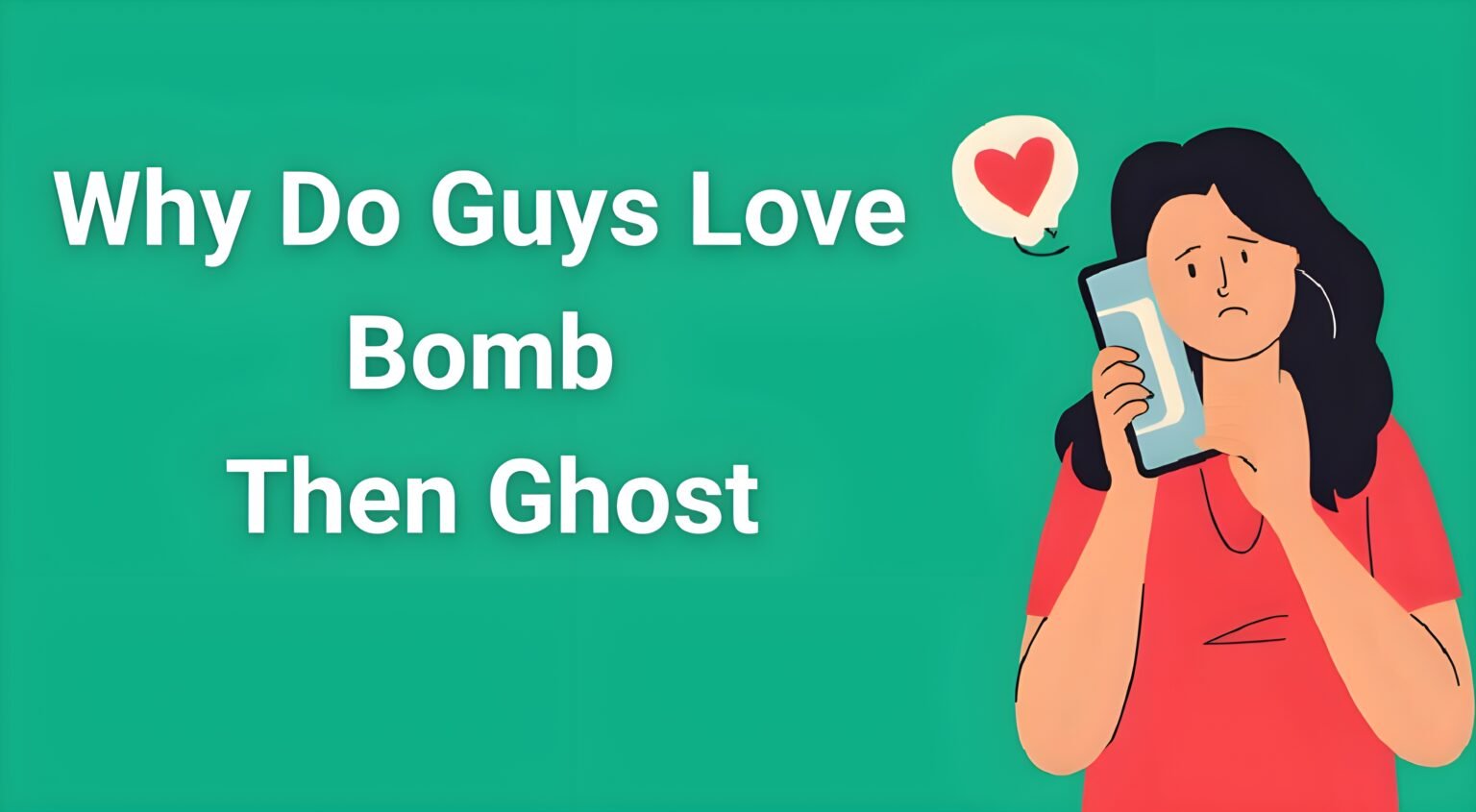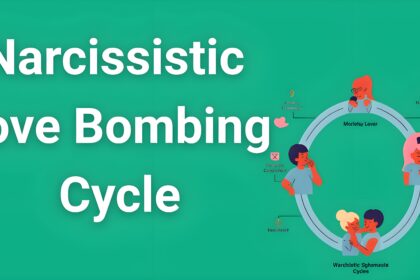If you’ve ever experienced the emotional whiplash of being showered with intense affection only to face complete radio silence, you’re not alone in asking “why do guys love bomb then ghost?” This devastating combination of love bombing followed by ghosting affects millions of people worldwide, leaving behind confusion, self-doubt, and emotional trauma that can last for months or even years.
- The Psychology Behind Love Bombing and Ghosting
- 8 Disturbing Reasons Why Guys Love Bomb Then Ghost
- Warning Signs You’re Being Love Bombed
- The Psychological Impact of Being Love Bombed Then Ghosted
- How to Heal and Recover From Love Bombing and Ghosting
- Protecting Yourself From Future Manipulation
- When Professional Support Becomes Necessary
- Building Healthy Relationships After Manipulation
- The Importance of Community and Support
- Long-term Recovery and Growth
- Frequently Asked Questions
- Conclusion
Understanding why guys love bomb then ghost isn’t just about getting closure – it’s about protecting yourself from future manipulation and recognizing the psychological patterns that drive this toxic behavior. The truth is, this isn’t about love at all; it’s about control, manipulation, and deep-seated psychological issues that have nothing to do with your worth as a person.
The Psychology Behind Love Bombing and Ghosting
Love bombing followed by ghosting represents one of the most psychologically damaging dating patterns in modern relationships. When someone asks “why do guys love bomb then ghost,” they’re really asking about a calculated manipulation tactic that exploits natural human bonding mechanisms.
The combination creates what psychologists call an “intermittent reinforcement schedule” – the most addictive form of behavioral conditioning. Just like a slot machine, the unpredictable pattern of intense reward followed by complete withdrawal creates a powerful psychological dependency that’s incredibly difficult to break.
This pattern isn’t random or accidental. It’s often a deliberate strategy used by individuals with narcissistic tendencies, commitment issues, or serious emotional unavailability. Understanding this can help you realize that being love bombed then ghosted says absolutely nothing about your value and everything about their psychological dysfunction.
8 Disturbing Reasons Why Guys Love Bomb Then Ghost
1. They’re Addicted to the Conquest, Not the Connection
Many men who love bomb then ghost are primarily motivated by the thrill of winning someone over rather than building a genuine relationship. The chase activates their reward centers, flooding their brains with dopamine and making them feel powerful and desired.
Once they’ve “won” – meaning you’ve become emotionally invested – the challenge disappears, and so does their interest. They’re not looking for love; they’re seeking validation and the ego boost that comes from knowing they can make someone fall for them quickly and intensely.
This explains why guys love bomb then ghost often start new pursuits immediately after disappearing. They’re already onto their next conquest, leaving behind a trail of confused and heartbroken individuals who never realized they were just participating in someone else’s ego game.
2. Narcissistic Supply and Control Mechanisms
For individuals with narcissistic tendencies, love bombing serves as a way to secure what psychologists call “narcissistic supply” – the constant attention, admiration, and emotional energy they need to maintain their inflated self-image. The ghosting phase isn’t the end of their plan; it’s often just the beginning of a longer manipulation cycle.
By creating intense emotional dependency through love bombing, then suddenly withdrawing, they establish psychological control. Many people who wonder why guys love bomb then ghost don’t realize that the ghoster often expects them to chase, beg, or desperately try to win back their attention.
This creates a power dynamic where the narcissist maintains control while their target becomes increasingly desperate for validation. If you’ve found yourself obsessively checking their social media, analyzing their last messages, or considering what you did wrong, you’ve experienced this manipulation firsthand.
3. Emotional Immaturity and Avoidance Patterns
Some men love bomb then ghost simply because they lack the emotional maturity to handle real intimacy. The love bombing phase feels safe because it’s surface-level – grand gestures and intense declarations don’t require genuine vulnerability or emotional depth.
When the relationship naturally progresses toward real intimacy, emotional sharing, or serious commitment discussions, their emotional immaturity triggers panic. Rather than communicate their fears or work through their discomfort, they choose the path of least resistance: complete avoidance through ghosting.
This pattern often stems from childhood emotional neglect, previous relationship trauma, or simply never learning healthy relationship skills. While this doesn’t excuse the harmful behavior, understanding why guys love bomb then ghost from this perspective can help you recognize that their inability to handle real connection isn’t a reflection of your worth.
4. The Thrill-Seeking Addiction Cycle
Some individuals become addicted to the neurochemical high of new relationships. Love bombing provides an intense rush of oxytocin, dopamine, and norepinephrine – the same chemical cocktail associated with drug addiction. When these chemicals naturally level off as relationships stabilize, they experience what feels like withdrawal.
Instead of working through this natural transition into deeper, more stable love, they ghost to chase the next high. This explains why guys love bomb then ghost often have a pattern of short, intense relationships rather than longer-term commitments.
They’re essentially relationship addicts, using other people as sources of neurochemical stimulation. Once the initial high wears off and real relationship work begins, they lose interest and move on to their next fix.
5. Fear of Intimacy Disguised as Romantic Intensity
Counterintuitively, some men who love bomb then ghost are actually terrified of real intimacy. The love bombing phase allows them to feel romantic and passionate without actually being vulnerable. Grand gestures and over-the-top declarations can substitute for genuine emotional openness.
When you start to reciprocate their intensity or when the relationship moves toward real vulnerability, their fear kicks in. They realize that continuing would require them to open up authentically, share their flaws, and risk genuine rejection based on who they really are rather than the persona they’ve projected.
Ghosting becomes their escape route from this terrifying possibility. By disappearing, they avoid the vulnerability that real intimacy requires while maintaining the fantasy that they’re romantic and passionate people.
6. Manipulation Testing and Boundary Assessment
Some manipulative individuals use love bombing and ghosting as a deliberate testing mechanism to identify potential long-term victims. They’re essentially screening for people who will accept poor treatment, chase after unavailable partners, or blame themselves when relationships fail.
If you respond to their ghosting by reaching out repeatedly, accepting blame, or welcoming them back without addressing their behavior, you’ve passed their “test” for manipulability. This makes you a prime candidate for future manipulation cycles, including potential hoovering attempts where they suddenly reappear.
Understanding this aspect of why guys love bomb then ghost can be particularly empowering because it helps you recognize that your response to their disappearance determines whether they’ll attempt to re-enter your life for another round of manipulation.
7. Commitment Phobia with Validation Needs
Many men who love bomb then ghost genuinely crave connection and validation but are simultaneously terrified of commitment. This creates an internal conflict where they desperately want to feel loved and desired but panic when that desire might lead to actual relationship expectations.
Love bombing allows them to experience the validation and connection they crave while ghosting serves as their escape hatch when things feel too real. They get to feel like they’re capable of deep love without actually having to deliver on any of their promises or declarations.
This pattern often repeats across multiple relationships, leaving a trail of confused partners who can’t understand how someone could be so passionate one moment and completely absent the next.
8. Entertainment and Emotional Vampirism
Perhaps the most disturbing reason why guys love bomb then ghost is purely for entertainment. Some individuals view romantic manipulation as a form of amusement, treating other people’s emotions like a game they can control and direct for their own satisfaction.
These emotional vampires feed off the chaos they create. They enjoy the power of making someone fall in love quickly, and they find equal satisfaction in the emotional turmoil their disappearance causes. Your confusion, pain, and desperate attempts to understand what happened provide them with a sense of power and control.
This type of behavior often indicates serious personality disorders or profound emotional dysfunction. If you’ve been targeted by someone who love bombs then ghosts for entertainment, the experience can be particularly traumatizing because there was never any genuine feeling or connection involved.
Warning Signs You’re Being Love Bombed
Recognizing love bombing before you become emotionally invested is crucial for protecting yourself from the inevitable ghosting that follows. Here are the key red flags that someone might be setting you up for this painful pattern:
Intensity That Doesn’t Match Timeline: They’re talking about love, future plans, or soul mate connections within days or weeks of meeting you. Healthy relationships build emotional intensity gradually over time.
Overwhelming Communication: They’re texting constantly, calling multiple times per day, or becoming upset when you don’t respond immediately. This isn’t romantic attention – it’s control disguised as affection.
Grand Gestures Over Substance: They focus on expensive gifts, elaborate dates, or dramatic romantic gestures while avoiding deeper conversations about values, goals, or real compatibility.
Isolation Encouragement: They want all your time and attention, subtly (or not so subtly) discouraging you from maintaining friendships or other relationships.
Mirror Matching: They seem to perfectly mirror your interests, values, and desires in ways that feel too coincidental. They’re likely reflecting back what they think you want to hear rather than sharing their authentic selves.
The Psychological Impact of Being Love Bombed Then Ghosted
Understanding why guys love bomb then ghost is important, but equally crucial is recognizing the serious psychological impact this experience can have on targets. The combination creates a form of psychological trauma that can affect your ability to trust, form future relationships, and maintain healthy self-esteem.
The sudden shift from intense positive attention to complete abandonment triggers what psychologists call “betrayal trauma.” Your nervous system goes into overdrive trying to process the contradiction between someone’s words and actions, often leading to symptoms similar to PTSD including intrusive thoughts, anxiety, depression, and hypervigilance in future relationships.
Many people who experience this pattern develop what’s known as a “trauma bond” – a powerful psychological attachment that forms through cycles of abuse and affection. Even though they know the treatment was wrong, they may find themselves missing the person, checking their social media obsessively, or hoping for their return.
For those struggling with the aftermath of being love bombed then ghosted, understanding that these reactions are normal responses to psychological manipulation – not signs of weakness or evidence that you “deserved” the treatment – is a crucial step in healing.
How to Heal and Recover From Love Bombing and Ghosting
Recovery from being love bombed then ghosted requires both emotional healing and practical strategies to prevent future manipulation. The first step is accepting that your confusion and pain are valid responses to psychological manipulation, not evidence of your own inadequacy.
Many survivors find that traditional relationship advice doesn’t address the specific trauma of this experience. Generic suggestions to “just move on” or “there are plenty of fish in the sea” miss the psychological complexity of what you’ve endured. You’re not just getting over a breakup – you’re recovering from manipulation and betrayal.
Effective healing often requires understanding the neurological impact of trauma bonding and learning specific techniques to rewire your brain’s response patterns. This might include mindfulness practices to manage intrusive thoughts, boundary-setting exercises to rebuild your sense of self-protection, and reality-testing techniques to combat the gaslighting effects of the experience.
For those seeking structured support in breaking free from the psychological aftermath, specialized resources designed specifically for trauma bond recovery can provide step-by-step guidance through the healing process. The “30 Day Trauma Bond Recovery Workbook” offers a science-based approach to understanding and breaking the neurological addiction that often forms after love bombing and ghosting experiences.
Protecting Yourself From Future Manipulation
Once you understand why guys love bomb then ghost, protecting yourself becomes about recognizing early warning signs and maintaining strong boundaries from the beginning of new relationships. This doesn’t mean becoming cynical or closed off – it means becoming discerning and valuing yourself enough to walk away from relationships that start with manipulation.
Red flag awareness is your first line of defense. When someone’s romantic interest feels too intense, too fast, trust that instinct. Healthy love grows gradually and feels sustainable rather than overwhelming. Someone who truly cares about you will respect your need to build trust over time rather than pressuring you to commit emotionally before you’re ready.
Setting and maintaining boundaries becomes crucial, especially around communication frequency, timeline expectations, and emotional intensity. Someone who reacts poorly to reasonable boundaries is showing you exactly who they are – believe them and respond accordingly.
When Professional Support Becomes Necessary
Sometimes, understanding why guys love bomb then ghost intellectually isn’t enough to fully heal from the experience. If you find yourself unable to trust new partners, constantly replaying the experience, or feeling worthless despite knowing the manipulation wasn’t your fault, professional support can be invaluable.
Many therapists now specialize in narcissistic abuse recovery and understand the specific psychological patterns involved in love bombing and ghosting. However, not all mental health professionals are familiar with these manipulation tactics, so finding someone with specific expertise in this area can make a significant difference in your recovery process.
For those seeking immediate clarity about their specific situation, a comprehensive analysis from a narcissistic abuse specialist can provide personalized insights into the manipulation patterns you experienced. Understanding the specific type of manipulator you encountered and their likely motivations can be tremendously healing and empowering.
If you’re questioning whether your experience truly constitutes abuse or if you’re somehow overreacting, a professional “Narcissistic Abuse Clarity Report” can provide expert validation and analysis of your specific situation, helping you understand exactly what psychological tactics were used against you and why they were so effective.
Building Healthy Relationships After Manipulation
Recovery isn’t just about healing from past manipulation – it’s about building the skills and confidence to create healthy relationships in the future. This means learning to recognize genuine compatibility markers versus manipulation tactics, understanding the difference between healthy romantic intensity and love bombing, and developing the self-worth to walk away from relationships that don’t serve your wellbeing.
Healthy relationships build gradually, with both partners respecting each other’s boundaries and autonomy. Real love doesn’t require you to abandon your friends, ignore your instincts, or accept treatment that makes you feel uncomfortable. Understanding these differences helps you recognize manipulation attempts before they can take hold.
For those who find themselves in situations where leaving isn’t immediately possible – whether due to shared living situations, financial constraints, or other practical barriers – learning survival strategies becomes crucial. Resources like “How to Survive When You Can’t Leave Yet” can provide practical techniques for maintaining your emotional wellbeing while you plan your safe exit strategy.
The Importance of Community and Support
Recovering from love bombing and ghosting often feels isolating, especially when friends and family members don’t understand the psychological complexity of what you’ve experienced. Finding community with others who’ve had similar experiences can be tremendously validating and healing.
Support groups, whether online or in-person, provide opportunities to share your story without judgment and learn from others who’ve successfully navigated similar manipulation. Many people discover that their experience, while painful, has given them insights and strength they never knew they possessed.
Long-term Recovery and Growth
Understanding why guys love bomb then ghost is just the beginning of a deeper journey toward emotional freedom and healthy relationships. The experience, while traumatic, often serves as a catalyst for developing stronger boundaries, deeper self-awareness, and more discerning relationship skills.
Many survivors report that once they’ve fully healed from the experience, they’re actually grateful for the lessons it taught them about manipulation, red flags, and their own worth. This doesn’t minimize the pain of the experience, but it acknowledges the growth and wisdom that can emerge from working through trauma with proper support and understanding.
Frequently Asked Questions
Q: Is love bombing always intentional manipulation?
A: Not always. Some people love bomb due to emotional immaturity or attachment issues rather than calculated manipulation. However, the impact on the target remains the same regardless of intent, and the behavior should still be recognized as unhealthy.
Q: Can someone who love bombs and ghosts change their behavior?
A: Change is possible but requires the person to recognize their pattern, take responsibility for the harm they’ve caused, and commit to extensive therapy or personal development work. Most people who engage in this behavior lack the self-awareness or motivation to change.
Q: Why do I miss someone who treated me this way? A: Missing someone who love bombed then ghosted you is a normal response to trauma bonding. The intense highs created by love bombing can create neurological addiction patterns that make you crave their return, even when you know the treatment was wrong.
Q: How long does it take to recover from being love bombed and ghosted?
A: Recovery timelines vary greatly depending on the intensity and duration of the manipulation, your personal history, and the support systems available to you. With proper understanding and tools, many people begin feeling significantly better within 30-90 days.
Q: Should I confront someone who love bombed then ghosted me?
A: Generally, no. People who engage in this behavior rarely provide satisfying explanations or take responsibility for their actions. Confrontation often leads to further manipulation, gaslighting, or additional emotional harm.
Q: How can I tell the difference between healthy romantic interest and love bombing?
A: Healthy romantic interest respects your boundaries, builds gradually over time, and doesn’t require you to abandon other relationships or ignore your instincts. Love bombing feels overwhelming, moves too fast, and often includes pressure to commit before you’re ready.
Conclusion
Understanding why guys love bomb then ghost isn’t about making excuses for manipulative behavior – it’s about protecting yourself from future manipulation and healing from past trauma. Whether motivated by narcissistic supply, emotional immaturity, commitment phobia, or outright malicious intent, this pattern represents a serious form of psychological manipulation that can have lasting effects on targets.
The most important thing to remember is that being love bombed then ghosted says nothing about your worth as a person and everything about the manipulator’s psychological dysfunction. Your confusion, pain, and difficulty moving on are normal responses to abnormal treatment, not signs of weakness or evidence that you somehow deserved the manipulation.
Recovery is possible, but it often requires more than time and traditional relationship advice. Understanding the specific psychological mechanisms involved, learning to recognize manipulation tactics, and developing strong boundaries are all crucial components of healing and protecting yourself in the future.
Remember that you deserve relationships built on mutual respect, honest communication, and genuine compatibility – not manipulation, control, or emotional chaos. Trust your instincts, value your worth, and never settle for treatment that leaves you questioning your own reality or value as a person.






